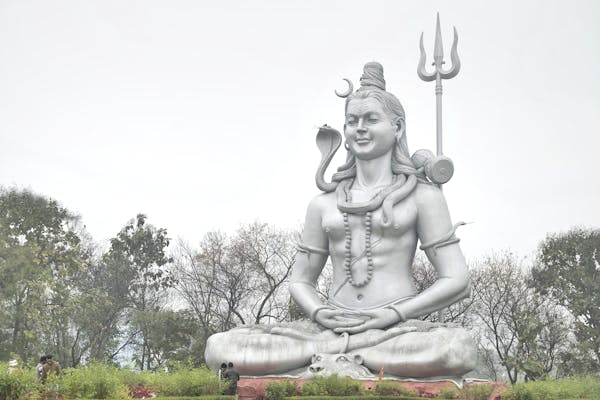
What is the Sawan Puja of Lord Shiva?
The Hindu Sawan month is the most auspicious and powerful for Worship Lord Shiva worshipping Lord Shiva. During the Sawan month (July–August), or Swan Maas, which is also the monsoon time in India, This is considered a holy month dedicated to Lord Shiva, as it is said to be his favorite time. The primary reason is Lord Shiva’s reunion with His consort Goddess Parvati during the Sawan month. In Sawan Puja in the Sawan Maas, along with Lord Shiva, Goddess Parvati is also worshipped by devotees. Devotees who perform Sawan Puja with dedication get rewarded with rich blessings and the fulfillment of their wishes. Devotees abstain from eating non-vegetarian food, abstain from alcohol, maintain brahmacharya (abstain from), and avoid other addictions.
Devotees visit nearby Lord Shiva temples or visit 12 Jyotirlingas to worship and perform Abhishekam of the Shivalinga with cow’s milk. water, honey, curd, sugar, rice, sandalwood paste, bel leaves, datura, white flowers, and other varieties of flowers. The entire month, but Sawan Somvaar, or Mondays of the month, are especially important as Mondays (which also represent the planet Moon) are dedicated to Lord Shiva (who is also known as Chandrashekhar, the Lord who wears a half-moon on his head), round the year.
Devotees who observe Sawan or Shravan Month keep a day-long fast on Sawan Somwar. The Sawan Somvar Vrat (fast) is kept from early morning until evening. Performing Abhishekam of Shiva Lingam at a Shiva temple or any of the 12 Jyotirlingas and hearing the Sawan ki Katha or the Sawan Vrat Katha are important and integral parts of the Sawan Puja. Some devotees choose to keep fast each day of this holy month. Worshipping Lord Shiva in Sawan month removes all many of one’s miseries, sins, and diseases and also brings desire fulfillment like prosperity, peace, good health, progress, spiritual growth, and attainments.
How to worship Lord Shiva in Sawan Maas: Puja Vidhi
Performing Sawan Puja and Vrat in Sawan Somvar during Sawan Maas is highly meritorious as per scripture. Following the Puja Vidhi correctly and performing the Sawan Puja is said to please the benevolent Bhagwan Mahadev or Paramatma Shiva (Lord Shiva), and His blessings are showered on the sadak/worshippers/devotees. One must also know that Sawan Vrat is said to have been part of Goddess Parvati’s rigorous penance to get Lord Shiva as her husband. The Puja Vidhi:
- Wake up early in the morning on Sawan Somvar, and after bathing, clean your house and Puja altar thoroughly.
- Setting the intention (the Sankalpa) for the Sawan Vrat is important at this stage for your wishes to be fulfilled.
- Worship Lord Shiva and Goddess Parvati at home ritualistically.
- Ideally, people visit Lord Shiva temple, or some are on a trip to the divine 12 Jyotirlinga shrines to conduct Rudra (Rudra is another name of Lord Shiva) Abhishekam (with the help of a karmkandi pundit), which is the main part of Sawan Puja Vidhi and should be conducted preferably before noon.
- For Abhishekam or Rudra Abhishekam: A mixture of fresh, unheated cow’s milk, water (Gangajal is preferred), curd, pure ghee, and honey is used for the sacred bath of the Shivalinga. The Shivalinga is anointed with sandalwood paste; Bilwa Patra or Bel leaves are a must-have. Bel fruit is also offered to Shivling, as the Bel is Lord Shivjee’s favorite flower, like Datura, Aak, Lotus, and Mogra. Akshat, or broken rice, Vibhuti, or Ash is used for making Tripunda on the western face of the Lingam.
- Keep chanting ‘Om Namah Shivaya’ or Mahamrityunjay Mantra or any other Lord Shiva Mantra while performing Abhishekam.
- Offer sweets, fruit, and bhangs to Lord Shiva.
- Worshipping Goddess Parvati (Shakti) is also important on Sawan Somvar or Sawan Puja. Sprinkle milk and water on the Devi Parvati idol and offer flowers like the Lotus, Hibiscus, etc. Kumkum and Akshat are also offered to her.
- During Sawan Maas’s reading of the Shiva Purana, Shiv Chaleesa has many merits.
- Meditate or chant the mantras of Lord Shiva for the rest of the day.
- Listening to or reciting the Sawan ki Katha or Sawan Vrat Katha during the day is important, as without listening to the Vrat Katha, the Sawan Vrat is considered incomplete.
Sawan Vrat Katha, or Sawan Ki Katha
Once, there was a moneylender who was an ardent devotee of Lord Shiva. He had everything: money and riches, but he was childless. His devotion and penance to please Lord Shiva were noteworthy. Impressed with the moneylender’s devotion, Goddess Parvati requested that her husband, Lord Shiva, bless the moneylender with a child. On Goddess Parvati’s insistence, Lord Shiva divulges to her that His devotee, the moneylender, will get a child, but the child will not live beyond 12 years. The moneylender learns about the conversation between his Ishta devata, Lord Shiva, and his consort, Goddess Parvati. The moneylender did not divulge this secret to his wife. A son was born to the moneylender, but the moneylender never divulged this fact to his wife. As the son grew, the moneylender sent his son for higher studies.
The Sawan Vrat story narrates that the moneylender instructs his son to conduct puja and yajna of Lord Shiva in whichever city or place he is in and donate to the needy. The son followed all the instructions from his father. The day he turned 12, he had organized a Yajna of Lord Shiva, but he fell ill. The boy’s uncle told him to rest while he managed things, but before long, the boy expired. The uncle, overwhelmed by sorrow and not knowing what to do, starts lamenting and crying.
Seeing this, Goddess Parvati once again requests that Lord Shiva give back the life of the young boy. Lord Shiva gave in to Goddess Parvati’s request and blessed the boy to come back to life. When his son came back home, the moneylender was overjoyed, as he knew that a miracle had occurred. The devotee of Lord Shiva, the moneylender, lived a happy life with his wife and child thereafter, by the grace of Lord Shiva.






